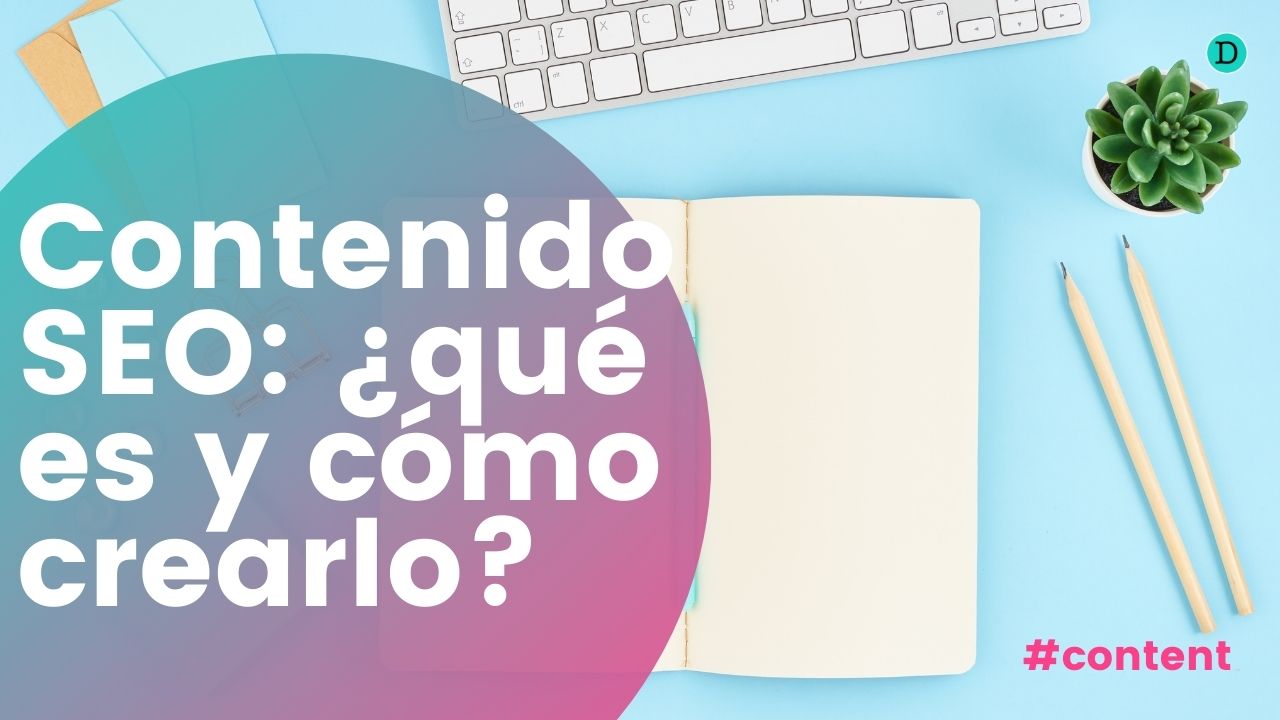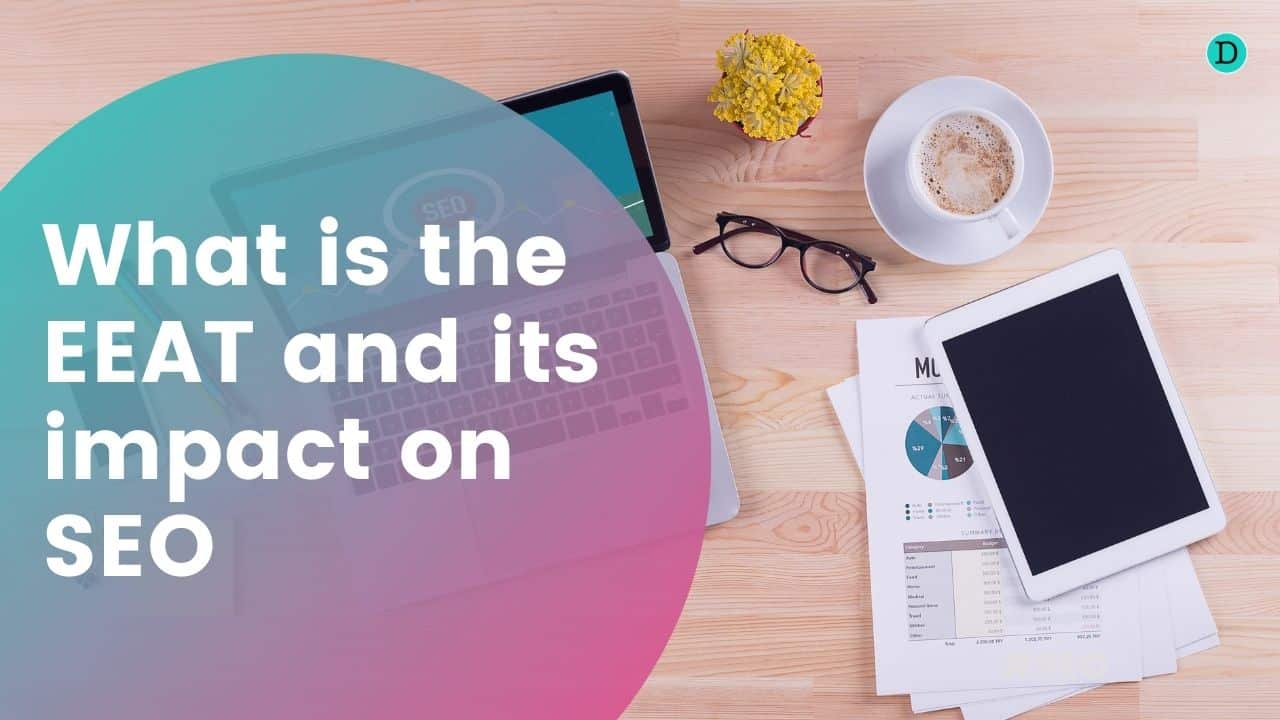
Digital Marketing Manager
Hello! We have already written and updated the Digital Marketing Trends for 2024
We had to start somehow the blog and I have chosen an evergreen and easy content (but you do not know what awaits you in the future); and since everyone in the industry has a content that tells what is and what will be new this year in the digital world, I want to go ahead and talk about the trends in digital marketing for 2022.
That’s just the tip of the iceberg.
If you take a look around the web, you will find a lot of information about these “new trends in online marketing“; however, they are not really trends and they are not really new.
It makes sense, the technology, the legislation, the media may change, but the basic pillars of the relationship with the customer and with advertising will never change.
This, in my opinion, is what marketing is all about: understanding and improving the life of the consumer. Nothing more (and nothing less).
How will marketing change in 2022?
índice
Although it is a very complicated question to answer, I believe that marketing will change and evolve in relation to the evolution and development of companies.
The evolutionary reality of online marketing varies a lot (in fact, it has absolutely nothing to do with it) and depends on how digitised a company is.
The fact that a company is digitised does not mean that they have many millions to invest in advertising and online marketing (although obviously the more investment resources they have, the better); it is a question of an attitude and a knowledge of the territory that should be, at this stage of the film, wide-ranging.
The more knowledge, training and involvement all members of a company have in their digital marketing and sales strategy, the more successful their strategy will be. Otherwise, it will be very difficult to move forward; because magic cannot be done, no matter how well-intentioned you are.
That said, many of the trends that were trends in the year 2000 will be new for some companies in 2021, and for others who do train daily in the online territory, these predictions may seem like a joke.
How will marketing change? I don’t think that’s the right question to ask. In my opinion, the right question is how will companies change their marketing strategy in the coming years?
Online marketing trends that could work
I don’t know if I’m going to write a lot of them; but I think they are enough (social Ads, Adwords and TikTok are not trends, sorry) and I consider them interesting; even if some of them don’t really fit or we don’t know how to find their usefulness with brands.
Here I go.
1. Voice marketing strategies
Language has always been very interesting to me, and of course audio could not be less interesting.
Besides, you already know that the trend is to go towards natural language when interacting with gadgets, so content on voice or audio devices will be a strategy to explore more deeply in the years to come.
In fact, there are already voice marketing agencies focused on voice marketing.
We will see in which sectors it will make sense and in which it will not.
In particular, taking a look at the Alexa app itself, it doesn’t seem to be having much impact at the moment in strategic sectors such as large-scale retail, but it does have an impact on leisure (music, for example) in the smart home category.
It probably also makes sense in the automotive sector, but at the moment, for the consumer, both usability and usefulness are rather limited.
In any case, here you can read some examples of content marketing with Alexa.
2. No code” automations and the death of programmers
It is an exaggeration and, at the same time, it is not.
This is not new, it has been happening for years: in the marketing environment, more and more applications, systems and DIY software are increasing and displacing the need for programming.
Technological advances are increasing rapidly and drag and drop solutions are making life easier for companies and users.
By 2025, many experts estimate that 70% of automation will be done through tools that do not need to be programmed, so if you have not yet explored it, I invite you to start exploring.
As I mentioned at the beginning, automation tools and the need to automate processes is relative to the typology of each company; but very necessary.
3. Salestech or digital B2B
The COVID-19 crisis has undoubtedly accelerated it, but there is no doubt that we are immersed in the salestech era, and no, I am not talking about giving people a hard time on Linkedin so that they will buy from you or listen to you.
As you can see in the following slide, the panorama is tremendous.
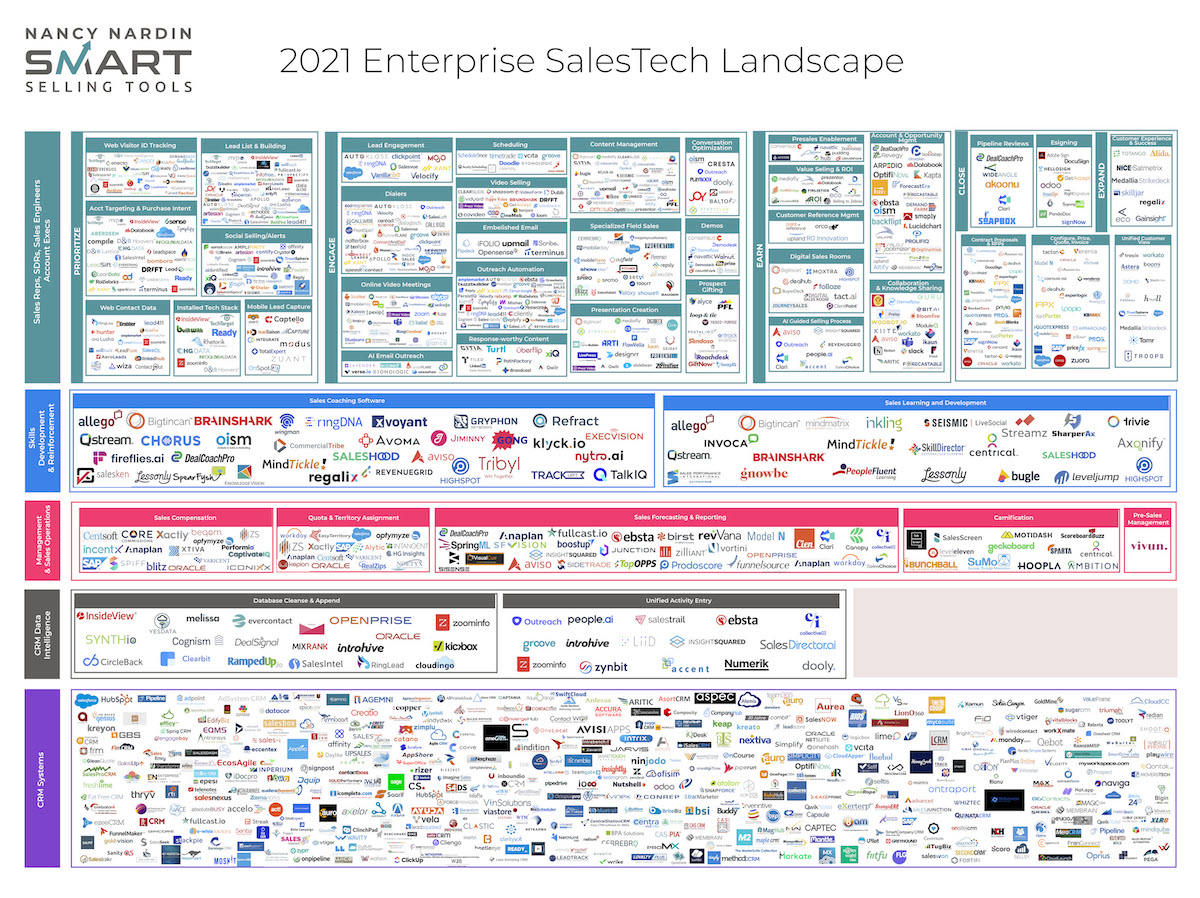
In fact, according to this study by the consultancy firm McKinsey, digital growth in the search and comparison phases of the customer journey has increased by more than 100%.
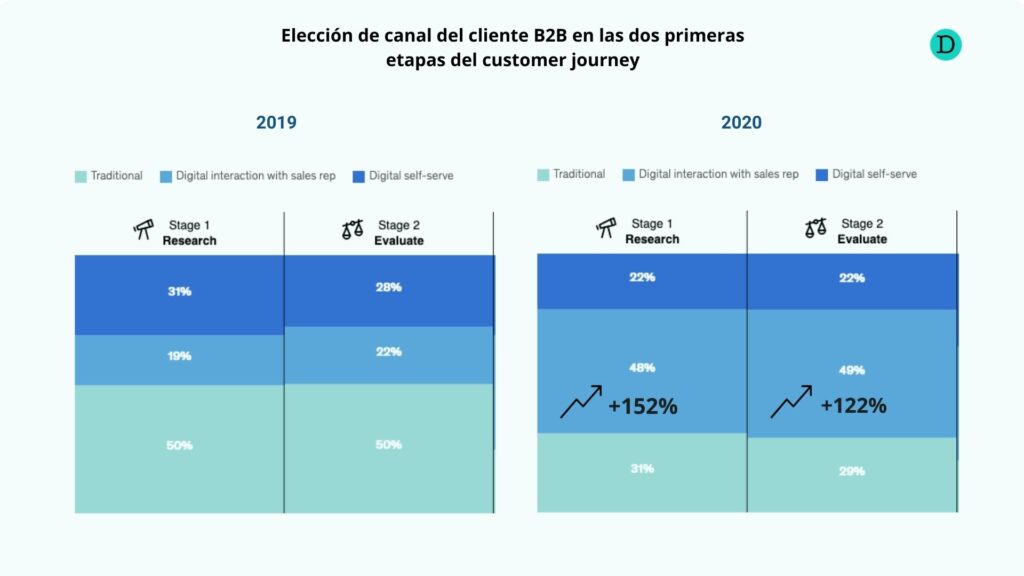
In this sense, opportunities in the B2B channel and in the real and professional automation of the sales funnel will be one of the keys in 2022 and beyond.
Forget about selling (only) face-to-face; salestech is more alive than ever.
4. Cross-cutting agencies to square the circle
In this day and age, and even more so in our sector, there is a lot of talk about specialisation.
And this is both yes and no.
The truth is that people prefer to centralise everything in a single company rather than having to talk to 10 suppliers at the same time.
A marketing manager would rather talk to one agency than 5, and he or she would rather talk to one person than 10.
The future of agencies is to be totally transversal to the business, as it does not make sense to dismember and disintegrate the strategy of a company based on the specialisations of different suppliers.
Let’s not get confused: we have to be specialists, but in the same place.
SEO, SEM, programmatic, CRM, databases, social networks or public relations do not make sense in a disintegrated way, as it is very difficult to build business through dismembered legs.
In this sense, the niche specialisation of an agency leads to missing out on the complete picture of the company it serves. Offering integrated solutions is essential to provide value to clients.
5. The end of third-party cookies
Google announced that it will block third-party cookies in its Google Chrome browser in 2022.
This is not surprising (besides, its competitors have already done so); but it will make it difficult for companies to interact with potential audiences on an advertising level as they have done until now.
Remarketing, personalisation, interests, display; in short, techniques that have their days numbered for impact.
This is not surprising, because the user demands privacy (and this is how it should be) and also the laws are increasingly tougher and more restrictive, as it could not be otherwise.
The question then is: how are we as a company going to deal with this lack of data in the world’s most widely used browser?
Although I would like to expand on the subject, the answer lies in the collection and exploitation of 1st party data ( the data that companies acquire from their users and customers at first hand).
In other words, the logical thing to do. The most important data for a company is not the data it buys from third parties; it is the data it obtains first hand.
Many see this as a disgrace for the digital ecosystem, but I think it is a clear opportunity for long-term work and to improve the real relationship with real customers.
A lot of customer centric, but if we’re flooding the user with third party data, I don’t know what to tell you.
Nowadays, there are already paths to follow, such as, for example, improving the organic channel (longer term); generating smaller but highly qualified audiences (Affinity and In Market) or negotiating with the media directly, as they are going to become relevant again.
We will see the future, little by little, but this is certainly a key change for 2022.
For our part, as always, we will be at the forefront and we will try to provide as much value as possible in each of our actions.
And so, let’s go for it.
6. Virtual Reality and its conjunction with the Metaverse
Another trendy topic, virtual reality or virtual worlds or the famous Metaverse.
By the way, I recommend this blog, as they are experts in Metaverse and everything to do with it.
The year 2022 is the year of the beginning of what will be one of the great revolutions not only in marketing, but in the world as we know it today.
Start studying about blockchain, NFTs, metaverses and cryptocurrencies because it is a field that will have a lot to look forward to.
Recommended: Metaverse and advertising.
7. Live stream shopping or live ecommerce
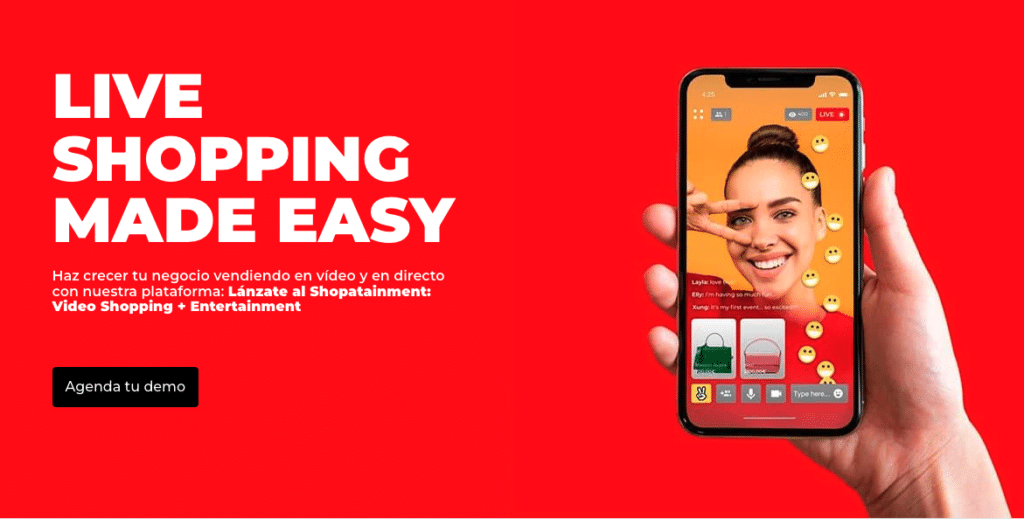
As the name suggests, if you want to sell in your e-commerce, you have to do it live.
It is a trend that has been going strong for some time now in the United States and which many brands are now joining.
The idea is to make a streaming event where the audience can buy the product that is being offered, so simple and inspiring.
In this post you can find several tools to promote your product live on the internet. Although one of our favourites is Online Live.
Programmatic advertising, future and present
As a quick reminder, programmatic advertising is about chasing audiences, not just buying space.
This type of advertising is the fuel of marketing today and will be for many years to come.
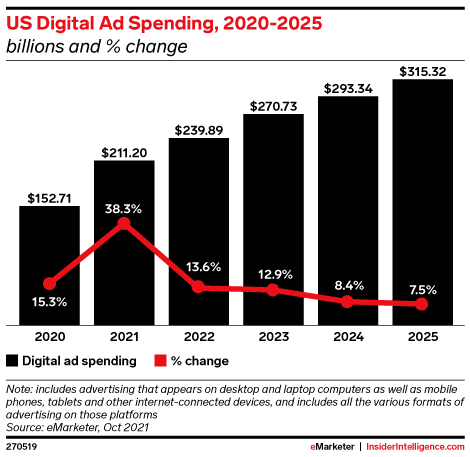
It is a type of advertising that is growing steadily and by 2022, according to Emarketer it will account for 86.5% of total advertising spend.
9. Inbound marketing will continue to be a hit
And there is a logic to it.
Nothing converts better than ranking for something that is in demand.
That’s why SEO will continue to be a trend for 2022, because the organic channel is the channel that currently converts the most, at least that’s what our colleagues at Flat 101 tell us in their 2022 conversion study (and which we corroborate with our own data).
Always keep SEO in your mind, my friend.
10. Chatbots, more
In other words, person-to-person customer service.
E-commerce does not exist, or should not exist, without a chat to deal with customers. Nobody likes the impersonal and chatbots are an excellent tool to generate the trust that is so lacking to push sales.
Chatbots are the kings of conversational marketing and will continue to be so in 2022.
For our part, as always, we will be at the forefront and we will try to provide as much value as possible in each of our actions and set effective digital marketing strategies.
And so, we are going all out.

